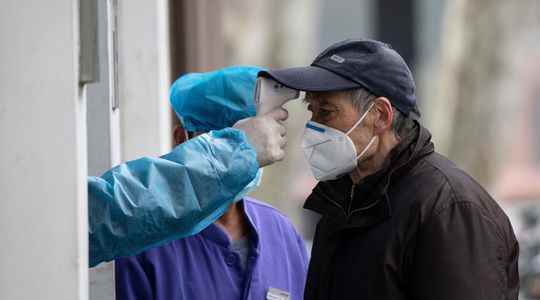The famous business district of Pudong and its huge skyscrapers symbols of Chinese economic power no longer shines. Since Monday, the eastern part of the city, across the Huangpu River which bisects Shanghai, has been a ghost zone. Strict confinement was imposed by local authorities after an explosion in Covid-19 cases – authorities reported 4,477 new infections in the megalopolis on Tuesday, compared to 3,500 the day before. In total, more than 60% of people affected by the Omicron variant in China are in Shanghai. Officially, 8.26 million Shanghainese were tested on Monday March 28 alone.
After procrastinating for a long time, the town hall finally had to resolve to apply the same methods as in Wuhan two years ago and in Shenzhen at the beginning of the month: more public transport, ban on going out, closure of shops, businesses and schools and repeated screenings. Friday April 1, it is the other part of the city, the district of Puxi, which will in turn be confined. But for how long?, worries the population.
“I’m panicking, I’m not optimistic, to be honest, explains a 24-year-old young man contacted on social networks. I didn’t think it would be so serious. Every part of our life, eating, going out, working, is affected”. Cédric, a French expatriate, tells us that queues of several hours formed on Monday in front of food stores. “People are buying vegetables, meat, rice… There is almost nothing left on the stalls, we really have a feeling of panic”.
Panic also among contact cases who are sent to large quarantine centers where they sleep in small boxes barely separated by half partitions. Other places of this type, with several thousand beds, are built in haste. “My husband is asymptomatic but he was taken to hospital, explains a British expatriate. The conditions are deplorable, it’s cold, there is no privacy, no one communicates with him and I was taken to a quarantine center where I will have to stay between 7 and 14 days. It is really terrible”.
Businesses are also very concerned
Long spared, the Chinese economic capital is in turn overtaken by the Omicron variant which affects 28 of the 35 Chinese provinces. Due to the “zero Covid” strategy pursued by the government, tens of millions of people are currently confined throughout the country.
Like residents, businesses are also very concerned. Shanghai indeed radiates over one of the most industrial regions of the country and contributes 3.8% to China’s gross domestic product. The city is the second largest financial center in Asia behind Tokyo, it hosts the largest container port in the world and the largest population of expatriates, including more than 7,000 French people out of the 12,000 in China.
“While the majority of G20 countries are emerging from containment measures linked to the pandemic, China seems to be stuck in its policy of zero tolerance and draconian measures to fight against Covid, launches Jorg Wuttke, president of the Chamber of Commerce of the European Union in China. Along with pressure on businesses, people seem less willing to put up with repeated lockdowns, as increasingly erratic local politics erode citizens’ trust in their local governments.” , he believes.
Ineffective vaccines
Many foreign investment banks operating in the country have already lowered their growth forecasts for 2022. “The spread of Omicron-related infections is testing the viability of this policy. The possibility of rapid transmission of Omicron in China is a key risk to its economy, said Louis Kuijs, chief economist for Asia-Pacific at S&P. The government will struggle to meet its growth target, in our view, given the tensions linked to the downturn in real estate, the war in Ukraine and Omicron. We expect 4.9% growth this year, while the government’s target is around 5.5%.” A difficult context, seven months before the Communist Party Congress which will see Xi Jinping seek a third term as head of the country.
Long a national pride, the zero Covid strategy is now facing strong discontent in some cities like Shanghai – where residents are less afraid to speak their minds -, and the reality of a highly transmissible variant. “Instead of seeing thousands of people queuing for almost daily screening tests, it would be better to see queues of people receiving a booster injection capable of coping with Omicron”, slips Jorg Wuttke.
The country’s choice to carry out mass testing and develop domestic vaccines – which have been shown to be poorly effective – also raises questions about why China has not turned to better serums. “Existing messenger RNA vaccines appear to be the best option, so it remains a mystery why China has not pursued this strategy, especially since Fosun and BioNTech already agreed to cooperate in the spring. 2020, and established a factory in Shanghai later in the year,” said Jorg Wuttke, the representative of European companies.
An opacity which explains why certain European countries like Spain discreetly offer messenger RNA vaccines, in this case Moderna, to their nationals. “We are also asking the French government to deliver us vaccines of this type, the only ones able to protect us and get us out of the isolation in which we have found ourselves for two years”, launches Franck Pajot, elected adviser to the French people of the foreigner in Beijing.
